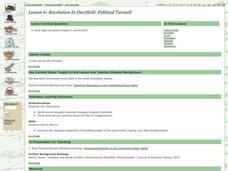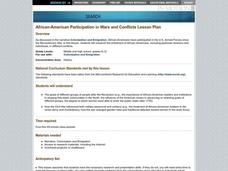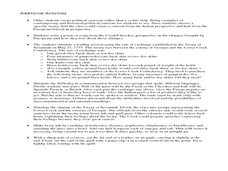National Endowment for the Humanities
The War in the South, 1778–1781
The second in a three-part look at the Revolutionary War focuses the years from 1778 through 1781 and zooms in on military operations in the southern colonies, the French alliance, and the role African-Americans played in events. Class...
National Endowment for the Humanities
Ending the War, 1783
The various peace proposals, made by both sides, to end the Revolutionary War come under scrutiny in this final lesson of a three-part series on the war. Class members read primary source documents and compare them with military...
National Endowment for the Humanities
The War in the North, 1775–1778
Using primary source documents, including maps, learners examine Revolutionary War events from 1775 to 1778. The focus here is on the challenges George Washington and the Continental army faced and how they persevered in spite of those...
Curated OER
Lesson: Allison Smith: What Are You Fighting For?
Trench art is a nontraditional art form created by soldiers in trenches during wartime. Artist Allison Smith connects her art to the American Revolution and the question: "What are you fighting for?" Kids examine her art, how it connects...
Curated OER
Examining Secondary Sources: The American Revolution
Learners who have a grasp on the events of the Revolutionary war view clips from five different films as secondary sources. They take notes on each clip thinking about historic inaccuracies. They then view parts of the film The Patriot...
National Endowment for the Humanities
Lesson 3: Religion and the Fight for American Independence
Pupils explore the role religion played in the American Revolutionary War. Using primary documents and writing exercises, students understand how religion was used in support of the war efforts and how specific religious groups responded...
Curated OER
Abigail as Political and Historical Observer
Lesson five in the series asks scholars to examine letters Abigail Adams wrote about her experiences during American Revolutionary War battles, her thoughts on slavery, and her concerns for her husband.
Curated OER
Revolutionary Boston
Students annotate core maps to explain either the political or the military situation in the British North American colonies, using Boston as a case study. They explain the British military strategy for suppressing the rebellion in Boston.
Curated OER
Causes of the Revolution Newspaper
Students examine the events that led to the Revolutionary War. Using the internet, they discover the advantages and disadvantages of each side. They use the information to produce a special edition newspaper on the war. They must include...
Curated OER
Daniel Shays and the Constitution
Students contrast the diverse views of Connecticut River Valley people in the years before, during, and after the Revolution.
Curated OER
Longfellow Amongst His Contemporaries: the Ship of State Dbq
Students evaluate the ship of state metaphor in relation to the historical events in America from the Revolutionary War to the Civil War. They synthesize ideas presented in ten different primary source documents and compose an essay...
Curated OER
Revolution in Deerfield: Political Turmoil
Eleventh graders explore loyalism and rebellion in revolutionary era Connecticut River Valley.
Curated OER
African-American Participation in Wars and Conflicts
Students research the enlistment of African Americans, including particular divisions and individuals, in different conflicts. They, in groups, research past American military conflicts, and report on the experience of African Americans...
National Endowment for the Humanities
Slavery and the American Founding: The "Inconsistency Not to Be Excused"
High schoolers examine slavery in the revolutionary and colonial eras of the United States. In this slavery lesson, students investigate the presence of slavery in early America, the language of the Constitution, and the intent of the...
National Endowment for the Humanities
Lesson 2: The United States, France, and the Problem of Neutrality, 1796–1801
While the French Revolution could be considered inspired by the American Revolution, it created thorny problems for the new United States. Should the United States get involved and be drawn into a European drama? Was the US strong...
Curated OER
Native Lands: Indians in Georgia-Shifting Ground Political Cartoon-Introduction
Students explore the relationship between the Creek, Cherokee, and European/American cultures prior to the American Revolution. Students do Internet research to identify and explain changes in these cultures, then create six panel...
Curated OER
Rockin’ the World: Rock and Roll and Social Protest in 20th Century America
Students explore protest songs. For this interdisciplinary lesson, students examine issues-based music by summarizing lyrics and revealing inferences, generalizations, conclusions, and points of view found in the songs.
Curated OER
Native Lands: Indians in Georgia , Losing Ground: Removal, 1802-1838
Students investigate the removal of the Creek Indians from Georgia. Students read the story of the Creek removal from Georgia, locate sites mentioned on a map, and create a related timeline. Students share their thoughts on the Creek...
Other popular searches
- American Revolutionary War
- Revolutionary War Poems
- Causes of Revolutionary War
- Revolutionary War Battles
- Revolutionary War Art
- Revolutionary War Music
- Unit on Revolutionary War
- The Revolutionary War
- Revolutionary War Unit
- Revolutionary War History
- U.s. Revolutionary War
- Revolutionary War on Wednesday



















